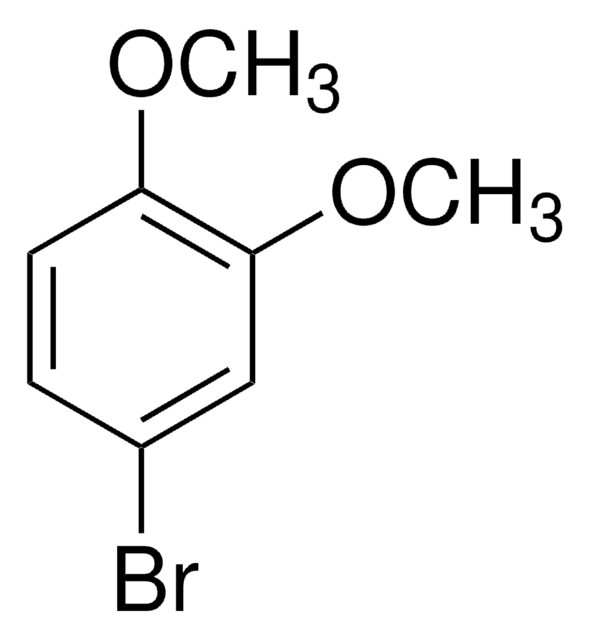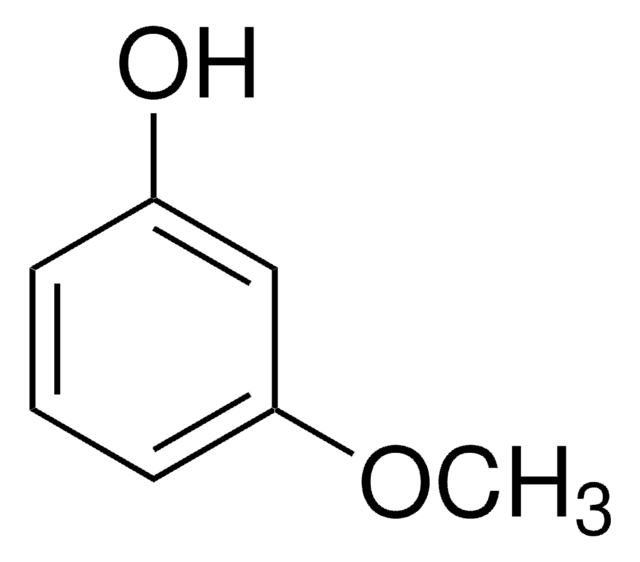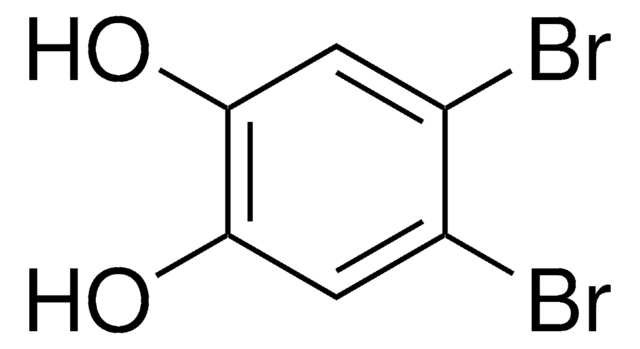All Photos(2)
About This Item
Linear Formula:
ClC6H3(OH)2
CAS Number:
Molecular Weight:
144.56
EC Number:
MDL number:
UNSPSC Code:
12352100
PubChem Substance ID:
NACRES:
NA.22
Recommended Products
Assay
97%
mp
90-94 °C (lit.)
SMILES string
Oc1ccc(Cl)cc1O
InChI
1S/C6H5ClO2/c7-4-1-2-5(8)6(9)3-4/h1-3,8-9H
InChI key
WWOBYPKUYODHDG-UHFFFAOYSA-N
Related Categories
General description
4-chlorocatechol was a major degradation product of 4-chloro-2-aminophenol (4C2AP). The degradation of 4-chlorocatechol was catalyzed by cphA-I enzyme.
Signal Word
Danger
Hazard Statements
Precautionary Statements
Hazard Classifications
Skin Corr. 1B
Storage Class Code
8A - Combustible corrosive hazardous materials
WGK
WGK 3
Flash Point(F)
Not applicable
Flash Point(C)
Not applicable
Personal Protective Equipment
dust mask type N95 (US), Eyeshields, Gloves
Certificates of Analysis (COA)
Search for Certificates of Analysis (COA) by entering the products Lot/Batch Number. Lot and Batch Numbers can be found on a product’s label following the words ‘Lot’ or ‘Batch’.
Already Own This Product?
Find documentation for the products that you have recently purchased in the Document Library.
Customers Also Viewed
A Farrell et al.
Journal of industrial microbiology & biotechnology, 28(6), 316-324 (2002-05-29)
A bacterium, CP1, identified as Pseudomonas putida strain, was investigated for its ability to grow on and degrade mono-chlorophenols and phenols as sole carbon sources in aerobic shaking batch culture. The organism degraded up to 1.56 mM 2- and 3-chlorophenol
Y Samet et al.
Journal of hazardous materials, 138(3), 614-619 (2006-07-18)
Electrochemical oxidation of 4-chloroguaiacol (4-CG) at Nb/PbO(2) anodes was studied under different experimental conditions such as initial concentration of substrate, electrolysis time, temperature and pH. We measured the concentrations of 4-chlorocatechol (4-CC), 2-methoxyhydroquinone (2-MHQ), maleic acid (MA) and carbon dioxide
J K Kim et al.
Chemosphere, 69(5), 689-696 (2007-07-03)
The presence and impact of hydroxyl radicals generated via the catalytic decomposition of H(2)O(2) over heterogeneous copper catalysts were investigated by using two detection methods, an electron spin resonance-spin trapping method and a chemical probe method. Detection of the (5,5-dimethyl-1-pyrroline-N-oxide)-OH
Yingxun Du et al.
Journal of hazardous materials, 139(1), 108-115 (2006-07-28)
The role of oxygen in the degradation pathway of 4-CP by Fenton system was investigated in this paper. The degradation of 4-CP, changes of Fenton reagent's concentration and formation of the intermediates in Fenton/O2 system were respectively compared with those
A Farrell et al.
Biodegradation, 10(5), 353-362 (2000-06-28)
A mixed microbial community, specially designed to degrade a wide range of substituted aromatic compounds, was examined for its ability to degrade mono-chlorophenols as sole carbon source in aerobic batch cultures. The mixed culture degraded 2-, 3-, and 4-chlorophenol (1.56
Our team of scientists has experience in all areas of research including Life Science, Material Science, Chemical Synthesis, Chromatography, Analytical and many others.
Contact Technical Service












